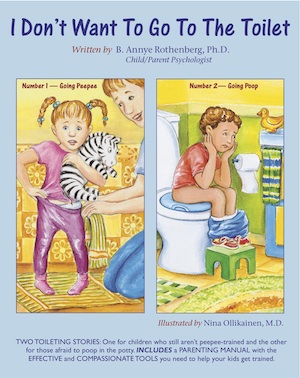I Don't Want To Go To The
Toilet
 HOW TO
EXPLAIN TOILET TRAINING TO YOUR CHILD
HOW TO
EXPLAIN TOILET TRAINING TO YOUR CHILD
Most young children need parents
and caregivers to motivate them to want to be toilet trained. Begin to
mention out loud when you have to go to the potty, how you know it’s
time (i.e., the pressure you feel in your tummy or bottom), and how
good you feel after. Talk to him about how learning to go peepee and
poop in the toilet is the next thing he needs to learn. Remind him of
the many things he’s already learned to do: wash his hands, feed
himself, walk, run, and climb, etc. Let him know that using
the toilet is something everyone in the whole wide world learns how to
do and that you have many ways to help him learn how, too.
Tell him you’ll be going with him to the bathroom and staying with him
as he learns to go on the toilet. You want him to be excited and
optimistic about toilet training, but not worried.
READ TO YOUR CHILD ABOUT
HER BODY AND TOILETING
Read books to your child about her body.
While you’re teaching her about how her body works, talk about what she
eats and drinks and how important both are in helping her grow and have
strong bones and muscles and lots of energy. Use pictures to show her
how food and drink go into her mouth, down her throat, and into her
digestive system. Explain how her body will use what it needs from the
food and drink, and that the rest will come out as peepee and poop. You
can show her children’s picture books such as this one – Number
2 – Going Poop – depicting the intestines and the places
where the pee and poop come out. (See p. 26.) Read from
these body books periodically until she begins to absorb the concepts,
albeit at a preschooler’s level.
Some excellent books are Look
Inside Your Body by Gina Ingoglia (Putnam Publishing, 1989) –
which is out of print but easy to find online – or Outside-In
by Claire Smallman (Barron’s Educational Series, 2010). You’ll need some
toilet-training books too. Many of them were written for
two-year-olds and may seem simplistic for preschoolers. For three- to
five-year- olds, good books for introducing kids to toileting include: What
to Expect When You Use the Potty by Heidi Murkoff (Harper Collins,
2000), Toilet Learning (just the children’s story) by Alison
Mack (Little, Brown 1978), and Koko Bear’s New Potty by Vicki
Lansky (Bantam Books 1999). And an excellent book for parents is the
American Academy of Pediatrics Guide to Toilet Training by Mark
Wolraich, M.D. (Bantam Books, 2003).
EXPLAIN HOW THINGS WILL
CHANGE
Preschoolers really begin to
understand what toileting is all about by watching Mommy and Daddy,
perhaps their older siblings, and other preschoolers using the toilet.
They should also watch toddlers getting their diapers changed. You can
explain why toddlers don’t like to be laid down and are trying to get
up. Talk about how much cleaner and faster it is to use the toilet and
how he won’t have to lie down anymore to be changed once he’s trained.
He will see the advantage of getting back to playing sooner.
USE YOUR TOILETING AS A
MODEL
Another way to motivate your child
is to draw up a timeline of your day with an emphasis on when, where,
and how often you go to the toilet. You can include a sketch for each
step of your day, including getting out of bed in the morning and then
sitting on (or standing at) the toilet, having breakfast, playing with
the kids or getting them ready for preschool, then using the toilet
again. Show how you use the toilet before leaving the house, after
eating, and at many other times. This illustrated timeline will show
your child how toileting is a frequent part of everyone’s everyday
life. If your child is interested, make a timeline of her day as well.
Indicate when she should use the toilet: when she wakes up, before
and/or after she eats, before she leaves the house, before she goes to
bed, etc. She will probably enjoy coloring the timeline.

